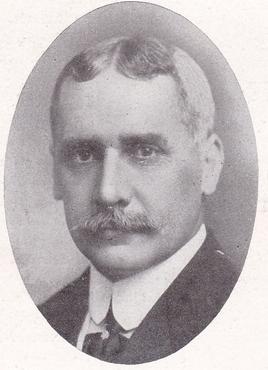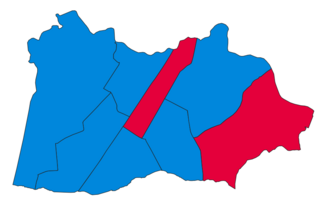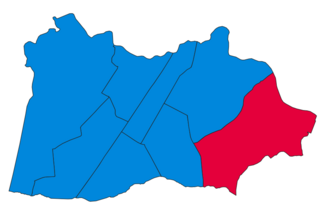
Birmingham City Council is the local government body responsible for the governance of the City of Birmingham in England, which has been a metropolitan district since 1974. It is the most populated local council area in the United Kingdom with 101 elected councillors representing over one million people, in 69 wards. The council headquarters are at the Council House in the city centre. The council is responsible for running nearly all local services, with the exception of those run by joint boards. The provision of certain services has in recent years been devolved to several council constituencies, which each have a constituency committee made up of councillors from that district. It is part of the West Midlands Combined Authority. On 6 September 2023, the council declared effective bankruptcy, and central government commissioners were later appointed to run the council under emergency measures.

Trafford is a metropolitan borough of Greater Manchester, England, with an estimated population of 236,301 in 2022. It covers 106 square kilometres (41 sq mi) and includes the area of Old Trafford and the towns of Altrincham, Stretford, Urmston, Partington and Sale. The borough was formed in 1974 as a merger of six former districts and part of a seventh. The River Mersey flows through the borough, separating North Trafford from South Trafford, and the historic counties of Lancashire and Cheshire. Trafford is the seventh-most populous district in Greater Manchester.

Stretford and Urmston is a constituency in Greater Manchester represented in the House of Commons of the UK Parliament since a 2022 by-election by Andrew Western, a Labour MP.

Stretford was, from 1868 to 1974, a local government district coterminate with the town of Stretford, Lancashire, England.

Sir Thomas Robinson was an English industrialist, Liberal politician and Member of Parliament, who late in his career sat in the House of Commons as an Independent.

Andrew Howard Western is a British politician of the Labour Party who was elected as Member of Parliament (MP) for Stretford and Urmston at the 2022 by-election. He had been the leader of Trafford Council since 2018, a post he vacated upon his election to parliament.

Elections to Sale Council were held on Thursday, 11 May 1961. One third of the councillors were up for election, with each successful candidate to serve a three-year term of office. The Conservative Party retained overall control of the council.

Elections to Sale Council were held on Thursday, 10 May 1962. One third of the councillors were up for election, with each successful candidate to serve a three-year term of office. The Conservative Party lost overall control of the council.

Elections to Sale Council were held on Thursday, 9 May 1963. One third of the councillors were up for election, with each successful candidate to serve a three-year term of office. The council remained under no overall control.

Elections to Sale Council were held on Thursday, 13 May 1965. One third of the councillors were up for election, with each successful candidate to serve a three-year term of office. The Conservative Party gained overall control of the council, from no overall control.

Elections to Sale Council were held on Thursday, 12 May 1966. One third of the councillors were up for election, with each successful candidate to serve a three-year term of office. The Conservative Party retained overall control of the council.

Elections to Sale Council were held on Thursday, 11 May 1967. One third of the councillors were up for election, with each successful candidate to serve a three-year term of office. The Conservative Party retained overall control of the council.

The first elections to Sale Council were held on Friday, 1 November 1935. This was a new council to replace Sale Urban Dsitrict Council. This election would create the entire 32-member council. Independents won overall control of the council.

Elections to Sale Council were held on Thursday, 12 May 1949. One third of the councillors were up for election, with each successful candidate to serve a three-year term of office. The Conservative Party retained overall control of the council.

Elections to Sale Council were held on Thursday, 11 May 1950. One third of the councillors were up for election, with each successful candidate to serve a three-year term of office. The Conservative Party retained overall control of the council.

Elections to Sale Council were held on Thursday, 10 May 1951. One third of the councillors were up for election, with each successful candidate to serve a three-year term of office. The Conservative Party retained overall control of the council.

Elections to Sale Council were held on Thursday, 8 May 1952. One third of the councillors were up for election, with each successful candidate to serve a three-year term of office. The Conservative Party retained overall control of the council.

Elections to Sale Council were held on Thursday, 7 May 1953. One third of the councillors were up for election, with each successful candidate to serve a three-year term of office. The Conservative Party retained overall control of the council.

Elections to Sale Council were held on Thursday, 13 May 1954. One third of the councillors were up for election, with each successful candidate to serve a three-year term of office. The Conservative Party retained overall control of the council.

Elections to Sale Council were held on Thursday, 12 May 1955. One third of the councillors were up for election, with each successful candidate to serve a three-year term of office. The Conservative Party retained overall control of the council.




















